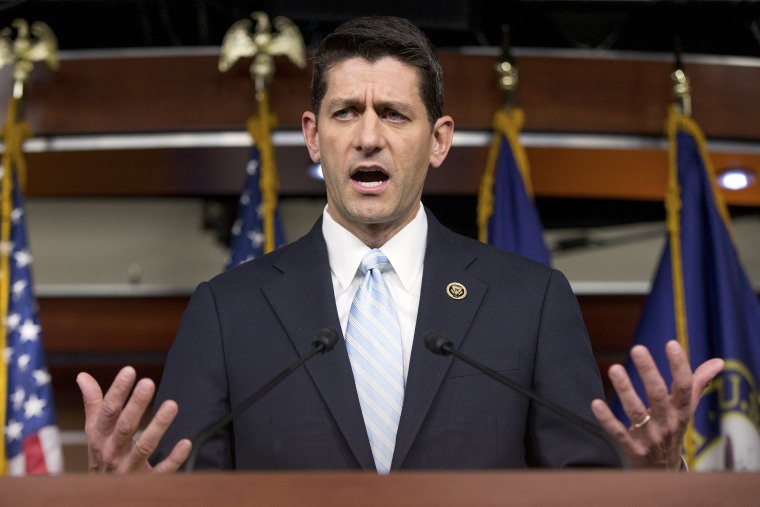
Rep. Paul Ryan of Wisconsin said Tuesday night that he would take over as House speaker — but only if his Republican colleagues meet several conditions.
In the weeks since Speaker John Boehner of Ohio announced his retirement last month, Ryan — the Republicans' vice presidential nominee in 2012 — hadn't defitively said whether he wanted the job of herding the notoriously fractious Republican caucus, despite urging from colleagues across the political spectrum.
That ended Tuesday night at a meeting of the House Republican Conference, where Ryan told fellow Republicans that he would run if the caucus unifies around a positive message of big ideas.
"We need to move from an opposition party to a proposition party," Ryan told reporters. "If I can truly be a unifying figure, then I will gladly serve."
Ryan said it's easy to blame President Barack Obama and the media — and "that is kind of fun sometimes," he acknowledged. But the American people want results, not debating victories, he said.
"If my colleagues entrust me with being the speaker, then I want us to be the solution," he said.
RELATED: Why the House Freedom Caucus could be Paul Ryan’s worst nightmare
Ryan said he was very happy as chairman of the powerful Ways and Means Committee and that he came to his decision to run for speaker "only reluctantly."
But "my greatest worry is the consequence of not stepping up," he said.
"I came to the conclusion that this is a very dire moment not just for Congress, not just for the Republican Party, but for our country," he said. "I think our country is in desperate need for leadership."
Brendan Buck, Ryan's spokesman, said that in the meeting with his colleagues, Ryan also insisted that House rules must be changed to make it harder for dissident members to try to oust the speaker.
"No matter who is speaker, they cannot be successful with this weapon pointed at them all the time," Buck said.
Ryan gave the conference a deadline of Friday to accept the conditions, but even if Republicans meet his demands, he still wouldn't have an unimpeded path to the speaker's chair. Rep. Daniel Webster of Florida, who has been endorsed by the conservative Freedom Caucus, said Tuesday night he's staying in the contest.
"I'm running for speaker to transform a broken Congress based on the power of a few into a principle-based, member-driven Congress," Webster said in a statement. "I look forward to continuing to share my vision of pushing down the pyramid of power and spreading out the base to allow each member to be successful."
Before Ryan spoke, Rep. Raúl Labrador of Idaho, a prominent Freedom Caucus member, said on MSNBC's "Andrea Mitchell Reports" that the group wouldn't abandon Webster.
"I think we're open to a lot of things, but the important thing is that we still are supporting Daniel Webster," Labrador said.
About the same time Ryan was speaking with his colleagues, Rep. Jason Chaffetz of Utah — chairman of the Oversight and Government Reform Committee and its panel investigating the 2012 attack on the U.S. Consulate in Benghazi, Libya — said he was dropping his speaker's bid.
"I think he would be an exceptional speaker," Chaffetz said of Ryan afterward. "He's the right person at the right time. I'm excited."
And Rep. Ryan Zinke, R-Montana, who'd said he was also considering a run, predicted that "we'll come together" behind Ryan.
"It's about purpose, and that's not about an individual," Zinke said. "It's about can Paul Ryan fix a fractured caucus. And I think he can."
But Rep. Walter Jones, R-North Carolina, a prominent conservative who's often skirmished with the Republican leadership, insisted, "This is not what we need."
"We need someone that can represent the American people and not special interests," Jones told reporters. "I didn't know what this event was tonight. If I knew it was a Paul Ryan rally for the speaker of the House, I wouldn't be here."
Boehner abruptly announced his retirement last month in battle over whether the government should be shut down unless federal funding for Planned Parenthood is eliminated. His second-in-command, Majority Leader Kevin McCarthy of California, withdrew as a candidate under conservative opposition earlier this month.
In the most recent NBC News/Wall Street Journal poll, released Monday, more than 6 in 10 Republican primary voters said they'd be comfortable with Ryan as speaker.
Significantly, 68% of Tea Party backers and 67% of Republicans identifying themselves as "very conservative" agreed.
NBC News' Alex Moe contributed. This article originally appeared on NBCNews.com.